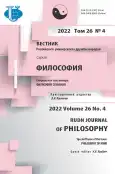Philosophy and Science on the Way to Knowing and Making Consciousness
- Авторлар: Mikhailov I.F.1
-
Мекемелер:
- Institute of Philosophy, Russian Academy of Sciences
- Шығарылым: Том 26, № 4 (2022): PHILOSOPHY OF MIND
- Беттер: 740-754
- Бөлім: PHILOSOPHY OF MIND
- URL: https://journal-vniispk.ru/2313-2302/article/view/325290
- DOI: https://doi.org/10.22363/2313-2302-2022-26-4-740-754
- ID: 325290
Дәйексөз келтіру
Толық мәтін
Аннотация
The latest progress in empirical studies of consciousness and spectacular advances in AI technologies kick philosophy out of the familiar comfort of uncontrolled proliferation of concepts and scholastic disputes. In the overview of the current state of empirical theories of consciousness, author reveals that those theories still find themselves in the pre-paradigmatic stage, therefore not yet posing an immediate existential threat to the philosophy of consciousness, though making it watch out. Author attempts to deal with the certain ambiguity of the term ‘consciousness’, stripping its meaning from parts already susceptible to science and technology and from parts still highly unlikely to be explained away. Besides, the relationship between philosophy and science is specified in general by analyzing them to their inner dynamics of theories and ontologies, showing that for science, the distinction between the two is substantially more important than for philosophy. From this perspective, philosophical schemas of consciousness claiming to be ‘experiential’ must have met recently formulated criteria for empirical theories of consciousness, otherwise failing to explain anything in the domain. Finally, author adds his pragmatic criterion that addresses the technological perspectives a theory provides. In the end, a winning competitive theory will have to let us produce and control artificial conscious devices.
Авторлар туралы
Igor Mikhailov
Institute of Philosophy, Russian Academy of Sciences
Хат алмасуға жауапты Автор.
Email: ifmikhailov@gmail.com
ORCID iD: 0000-0001-8511-8849
Doctor in Philosophy, Senior Research Fellow
12/1, Goncharnaya Str., Moscow, 109240, Russian FederationӘдебиет тізімі
- Block N. Comparing the major theories of consciousness. In: Gazzaniga MS, ed. The Cognitive Neurosciences. IV. Cambridge, MA: MIT Press; 2009. P. 1111-1123.
- Deheane S, Changeux JPJPP, Dehaene S, Changeux JPJPP. Experimental and Theoretical Approaches to Conscious Processing. Neuron. 2011;70(2):200-227. https://doi.org/10.1016/j.neuron.2011.03.018
- Doerig A, Schurger A, Herzog MH. Hard criteria for empirical theories of consciousness. Cognitive Neuroscience. 2021;12(2):41-62. https://doi.org/10.1080/17588928.2020.1772214
- Hohwy J, Seth A. Predictive processing as a systematic basis for identifying the neural correlates of consciousness. Philosophy and the Mind Sciences. 2020;1(II). https://doi.org/10.33735/phimisci.2020.II.64
- Schurz G. Structural correspondence, indirect reference, and partial truth: Phlogiston theory and Newtonian mechanics. Synthese. 2011;180(2):103-120. https://doi.org/10.1007/s11229-009-9608-7
- Mikhailov I. Has Time of Philosophy Passed? Voprosy filosofii. 2019;(1):15-25. https://doi.org/10.31857/S004287440003613-9
- Wittgenstein L. Tractatus logico-philosophicus. In: Tractatus Logico-Philosophicus. Anthem Press; 2021. P. 56-250. https://doi.org/10.2307/j.ctv22d4t7n.8
- Vintiadis E. Why a Naturalist Should Be an Emergentist about the Mind. SATS. 2013;14(1):38-62. https://doi.org/10.1515/sats-2013-0003
- Van Inwagen P. Meta-Ontology: A Brief Introduction. Erkenntnis. 1998;48(2/3):233-250. https://doi.org/10.5840/wcp201999235
- Wittgenstein L. Philosophical Investigations. 3rd ed. Oxford: Blackwell Publishers Ltd; 1986.
- Kant I. Metaphysical Foundations of Natural Science. Cambridge: Cambridge University Press; 2004.
- Gallagher S, Zahavi D. The Phenomenological Mind. [2nd ed]. Routledge; 2013. https://doi.org/10.4324/9780203126752
- Tacca MC. Syntactic Compositionality, Systematicity, and Productivity. In: Tacca MC. Seeing Objects: The Structure of Visual Representation. Paderborn: Brill, mentis; 2010. P. 37-52. https://doi.org/10.30965/9783969751190_005
- Mashour GA, Roelfsema P, Changeux JP, Dehaene S. Conscious Processing and the Global Neuronal Workspace Hypothesis. Neuron. 2020;105(5):776-798. https://doi.org/10.1016/j.neuron.2020.01.026
- Alkire MT, Hudetz AG, Tononi G. Consciousness and anesthesia. Science. 2008;322(5903):876-880. doi: 10.1126/science.1149213
- Hudson AE, Calderon DP, Pfaff DW, Proekt A. Recovery of consciousness is mediated by a network of discrete metastable activity states. Proceedings of the National Academy of Sciences of the United States of America. 2014;111(25):9283-9288. https://doi.org/10.1073/pnas.1408296111
- Arp R. Consciousness and Awareness. Switched-On Rheostats: A Response to de Quincey. Journal of Consciousness Studies. 2007;14(3):101-106.
- Baars B. J. Cognitive Theory of Consciousness. Cambridge: Cambridge University Press, 1993. 446 p.
- Baars BJ, Franklin S, Ramsoy TZ. Global workspace dynamics: Cortical “binding and propagation” enables conscious contents. Frontiers in Psychology. 2013;4(200). Accessible from: https://www.frontiersin.org/articles/10.3389/fpsyg.2013.00200/full. https://doi.org/10.3389/fpsyg.2013.00200
- Boly M, Seth AK, Wilke M, et al. Consciousness in humans and non-human animals: Recent advances and future directions. Frontiers in Psychology. 2013;4(625):1-20. https://doi.org/10.3389/fpsyg.2013.00625
- Tononi G, Boly M, Massimini M, Koch C. Integrated information theory: from consciousness to its physical substrate. Nature Reviews Neuroscience. 2016;17(7):450-461. https://doi.org/10.1038/nrn.2016.44
- Tononi G. Consciousness as integrated information: A provisional manifesto. Biological Bulletin. 2008;215(3):216-242. https://doi.org/10.2307/25470707
- Tononi G. Integrated information theory of consciousness: an updated account. Archives italiennes de biologie. 2012;150(4):293-329. https://doi.org/10.4449/aib.v149i5.1388
- Mayner WGP, Marshall W, Albantakis L, Findlay G, Marchman R, Tononi G. PyPhi: A toolbox for integrated information theory. PLoS Computational Biology. 2018;14(7): e1006343. https://doi.org/10.1371/journal.pcbi.1006343
- Edlund JA, Chaumont N, Hintze A, Koch C, Tononi G, Adami C. Integrated information increases with fitness in the evolution of animats. PLoS Computational Biology. 2011;7(10):e1002236. https://doi.org/10.1371/journal.pcbi.1002236
- Rosenthal DM. A theory of consciousness. In: Block N, Flanagan OJ, Guzeldere G, eds. The Nature of Consciousness: Philosophical Debates. Cambridge MA: MIT Press; 1997.
- Rosenthal DM. Consciousness and its function. Neuropsychologia. 2008;46(3): 829-840. https://doi.org/10.1016/j.neuropsychologia.2007.11.012
- Vergauwen R. Consciousness, recursion and language. In: Lowenthal F, Lefebvre L, editors. Language and Recursion. New York: Springer; 2014. https://doi.org/10.1007/978-1-4614-9414-0_13
- Corballis MC. The Recursive Mind: The Origins of Human Language, Thought, and Civilization. Journal of Multilingual and Multicultural Development. 2011:33(3);319-321. https://doi.org/10.1080/01434632.2012.656976
- Baryshnikov PN. Language, brain and computation: from semiotic asymmetry to recursive rules. RUDN Journal of Philosophy. 2018;22(2):168-182. https://doi.org/10.22363/2313-2302-2018-22-2-168-182
- Lamme VAF, Roelfsema PR. The distinct modes of vision offered by feedforward and recurrent processing. Trends in Neurosciences. 2000;23(11):571-579. https://doi.org/10.1016/S0166-2236(00)01657-X
- Lamme VAF. Visual Functions Generating Conscious Seeing. Frontiers in Psychology. 2020;11:e83. https://doi.org/10.3389/fpsyg.2020.00083
- Lamme VAF. How neuroscience will change our view on consciousness. Cognitive Neuroscience. 2010;1(3):204-220. https://doi.org/10.1080/17588921003731586
Қосымша файлдар









